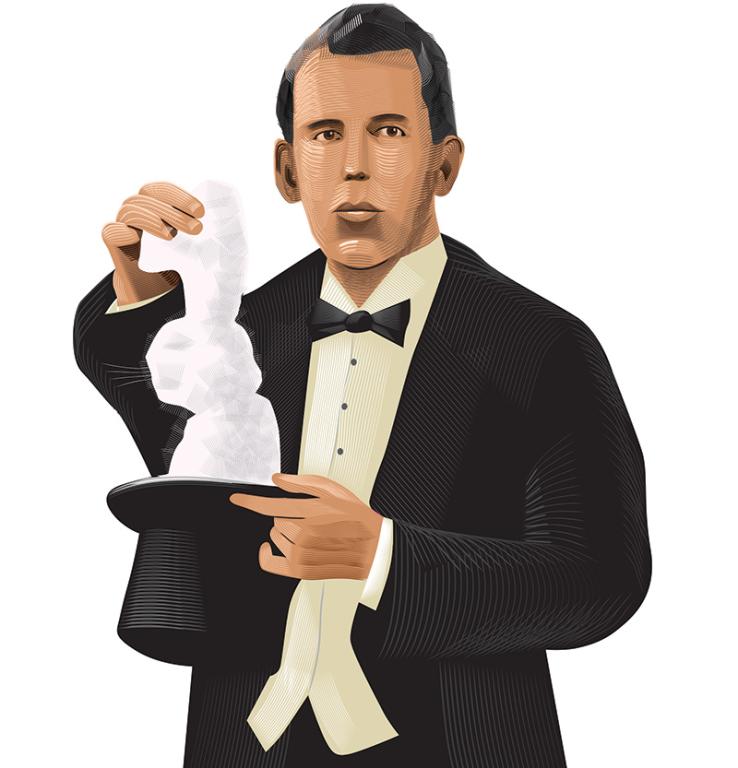
John Mulholland billed himself as a conjurer for intellectuals. He seemed to like Princetonians best. He was perhaps the most popular visitor to campus during the 1930s, giving at least 23 local performances between 1928 and 1940 — including appearances at the University, the Nassau Club (known as a haunt for faculty and alumni), and Princeton township. He also made appearances at the Princeton Club in New York City.
The 1930s were the last and brightest decade of the golden age of stage magic. Magicians appeared daily in city theaters — and in pulp magazines, almost as often as detectives did. The era’s scientific temperament seemed to take pleasure in spectacular displays of intellection.
“I find it far simpler to fool an audience of Princeton undergraduates than a kindergarten class,” Mulholland told The Daily Princetonian in 1932, “and it is even easier to mystify a group of your professors.” The reason, he said, is that magic tricks don’t rely on the hand being quicker than the eye. They rely on the mind being quicker than itself. His audience would dismiss any motion he made during a trick, as long as they could explain its purpose. (He later quoted the humorist Josh Billings on this point: “It ain’t so much ignorance that ails mankind as it is knowing so much that ain’t so.”)
“I find it far simpler to fool an audience of Princeton undergraduates than a kindergarten class.”
Mulholland’s association with Princeton helped him to establish his brand as “the Dean of Magicians.” The son of a teacher, he tended to frame performances as lectures with special effects. (Topics included “Magic of the World,” “Certain Ocular Illusions,” “Superstition and School,” and “The Science of Soothsaying.”) His performance costume was “almost professorial,” a biographer wrote: “He favored a dignified bow and three-piece suit, with the chain and fob of his pocket watch displayed across the vest.” He often carried a deck of playing cards that displayed the logo of the Princeton Club.
Following the example of his mentor, the famous illusionist Harry Houdini, he put his unlikely skills in the nation’s service. Houdini hired him as a teenager to help write a series of lectures exposing psychics as frauds who cheated Americans out of millions of dollars a year. Mulholland wrote books on similar subjects and advised fraud investigators. In 1946, he wrote in a questionnaire for his alma mater, Horace Mann School, that he’d been assisting government and law-enforcement agencies for three decades.
During World War II, Mulholland gave anti-Nazi lectures with titles like “Unmasking Propaganda Through Magic.” (“The laws of psychological deception are universally applicable,” he said. “We Americans must build strong resistance to falsehood.”) He also published a pocket book of magic tricks for U.S. troops.
After the war, the CIA hired Mulholland as its in-house magician. Not to entertain; to teach. They believed that close-up magic and sleight of hand could help agents to steal items, exchange secret messages, or slip poison pills into drinks. He worked as a consultant for the CIA for years, writing two manuals for the spy agency that give deft advice about psychology and deception. Some examples of that advice: A man doing sleight of hand can make any movement he likes, as long as witnesses find it explicable. A man who’s minding his own business won’t draw attention, but a man who’s minding other people’s business will. If a man must invent someone to blame for his own actions, he should describe a totally average person with one strange detail, like a missing finger. If a woman pretends not to understand something as a way of fishing for information, men won’t question it, but women will. Stage magic is 80% psychology, Mulholland liked to say, and spycraft turns out to be much the same.
The war ended the golden age of stage magic. But it did so by redirecting the illusions, not ending them. Mulholland’s work for the CIA took him off the university lecture circuit. Not coincidentally, after the war, Princeton became, at least for a while, something of a satellite campus for the CIA. Universities no longer gave priority to showmanship; they gave priority to secrets.
Or, as they say in the business: Now you see it; now you don’t.
